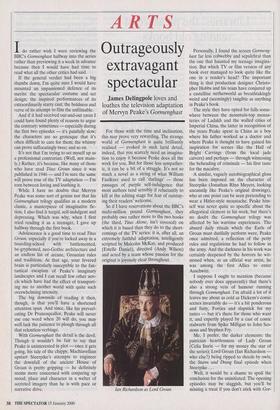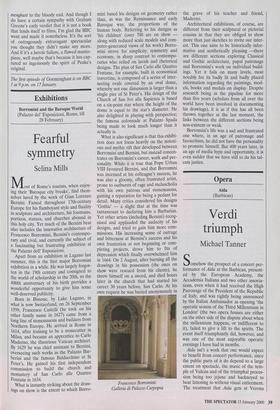ARTS
Outrageously extravagant spectacular
James Delingpole loves and loathes the television adaptation of Mervyn Peake's Gormenghast Ido rather wish I were reviewing the BBC's Gormenghast halfway into the series rather than previewing it a week in advance because then I would have had time to read what all the other critics had said.
If the general verdict had been a big thumbs down, I'm quite sure I would have mounted an impassioned defence of its merits: the spectacular costume and set design; the inspired performances of its extraordinarily starry cast; the boldness and verve of its attempt to film the unfilmable.
And if it had received out-and-out raves I could have found plenty of reasons to argue the contrary: sometimes — especially during the first two episodes — it's painfully slow; the characters are so grotesque that it's often difficult to care for them; the whimsy can prove suffocatingly twee; and so on.
It's not that I'm trying to set myself up as a professional contrarian. (Well, not main- ly.) Rather, it's because, like many of those who have read Titus Groan since it was published in 1946 — and I'm sure the same will prove true of the TV adaptation — I'm torn between loving and loathing it.
While I have no doubts that Mervyn Peake was some sort of genius nor that his Gormenghast trilogy qualifies as a modern classic, a masterpiece of imaginative fic- tion, I also find it turgid, self-indulgent and depressing. Which was why, when I first tried reading it as a teenager, I gave up halfway through the first book.
Adolescence is a good time to read Titus Groan, especially if you're locked away in a boarding-school with battlemented, be-gryphoned, neo-Gothic architecture and an endless list of arcane, Groanian rules and traditions. At that age, your fevered brain is particularly susceptible to the fan- tastical escapism of Peake's imaginary landscapes and I can recall few other nov- els which have had the effect of transport- ing me to another world with quite such overwhelming intensity.
The big downside of reading it then, though, is that you'll have a shortened attention span. And since, like his prevari- cating Dr Prunesquallor, Peake will never use one word when 20 will do, you may well lack the patience to plough through all that relentless verbiage.
With Gormenghast the detail is the devil. Though it wouldn't be fair to say that Peake is uninterested in plot — once it gets going, his tale of the chippy, Machiavellian upstart Steerpike's attempts to engineer the downfall of the ancient House of Groan is pretty gripping — he definitely seems more concerned with conjuring up mood, place and character in a welter of accreted imagery than he is with pace or narrative drive. For those with the time and inclination, this may prove very rewarding. The strange world of Gormenghast is quite brilliantly realised — evoked in such lurid detail, indeed, that you scarcely need an imagina- tion to enjoy it because Peake does all the work for you. But for those less sympathet- ic, it can be a bit of a struggle. It's not so much a novel as a string of what William Faulkner used to call 'darlings' — those passages of purple self-indulgence that most authors tend sensibly if reluctantly to kill at the editing stage for fear of outstay- ing their readers' welcome.
So if I have reservations about the BBC's multi-million pound Gormenghast, they probably owe rather more to the two books (the third, Titus Alone, isn't covered) on which it is based than they do to the short- comings of the TV series: it is, after all, an extremely faithful adaptation, intelligently scripted by Malcolm McKay, and produced (Estelle Daniel), directed (Andy Wilson) and acted by a team whose passion for the original is joyously clear throughout.
Ian Richardson as Lord Groan Personally, I found the screen Gormeng- hast far less cobwebby and sepulchral than the one that haunted my teenage imagina- tion. But which TV or film version of any book ever managed to look quite like the one in a reader's head? The important thing is that production designer Christo- pher Hobbs and his team have conjured up a castelline netherworld as breathtakingly weird and (seemingly) tangible as anything in Peake's book.
The style they have opted for falls some- where between the mountain-top monas- teries of Ladakh and the walled cities of Imperial China, the latter in recognition of the years Peake spent in China as a boy where his father worked as a doctor and where Peake is thought to have gained his inspiration for scenes like the Hall of Bright Carvings (from the local jade carvers) and perhaps — through witnessing the beheading of criminals — his first taste for the macabre.
A similar, vaguely autobiographical gloss has been imposed on the character of Steerpike (Jonathan Rhys Meyers, looking uncannily like Peake's original drawings), who at one point can be seen pretending to wear a Hitler-style moustache. Peake him- self was never quite so specific about the allegorical element in his work, but there's no doubt the Gonnenghast trilogy was affected by his wartime experiences. The absurd daily rituals which the Earls of Groan must dutifully perform were, Peake once admitted, a reflection of the petty rules and regulations he had to follow in the army. And the darkness in his work was certainly deepened by the horrors he wit- nessed when, as an official war artist, he was among the first Allies to enter Auschwitz.
I suppose I ought to mention (because nobody ever does apparently) that there's also a strong vein of humour running through Gormenghast. I'm afraid a lot of it leaves me about as cold as Dickens's comic scenes invariably do — it's a bit ponderous and fusty, Forties and slapstick for my tastes — but it's there for those who want it, and expertly played by a cast of comic stalwarts from Spike Milligan to John Ses- sions and Stephen Fry.
Me, I prefer, the darker elements: the patrician heartlessness of Lady Groan (Celia Imrie — for my money the star of the series); Lord Groan (Ian Richardson — who else?) being ripped to shreds by owls; the Sturrn und Drang final episode when Steerpike Well, it would be a shame to spoil the conclusion for the uninitiated. The opening episodes may be sluggish, but you'll be missing a treat if you don't stick with Gor- menghast to the bloody end. And though I do have a certain sympathy with Graham Greene's early verdict that it is not a book that lends itself to films, I'm glad the BBC went and made it nonetheless. It's the sort of outrageously extravagant spectacular you thought they didn't make any more. And if it's a heroic failure, a flawed master- piece, well maybe that's because it has cap- tured so ingeniously the spirit of Peake's original.
The first episode of Gormenghast is on BBC 1 at 9 p.rri. on 17 January.



























































 Previous page
Previous page